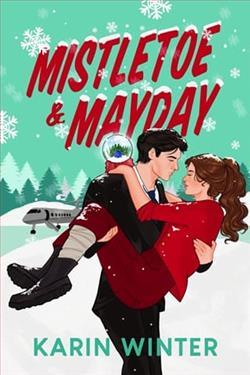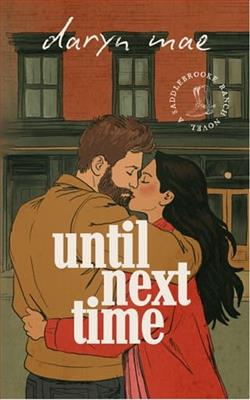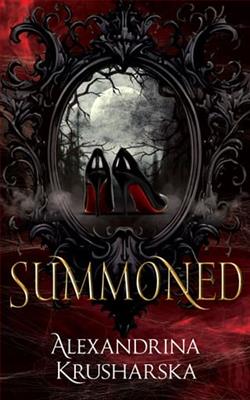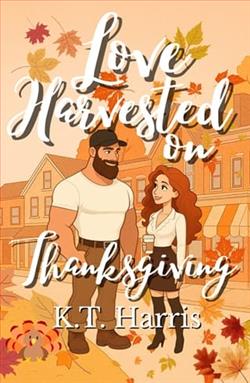Page 10 of Claiming the Tower
Looking up, she realised her corner had acquired more people. Tonight, they were at one of the current meeting spots for the White Horse folks. They were upstairs of a pub near a portal and catering to magical folk in Devon.
The furnishings weren’t much— wooden benches, cushions, and some rather battered chairs— but the food was decent. And one could get tea as well as beer, at least upstairs. It also kept things somewhat in the family. The publican’s sister was one of the White Horse and the regular custom helped keep the pub running with a little ease.
Tonight, Hereswith had turned up to help with the summer solstice planning. The evening before, she’d lend a hand with whatever the final plans turned into. The daytime practices were a little more visible, and that was a narrow path to walk with her work. Hereswith treasured the moments with the society, but she didn’t want to risk what they meant. She had worried for years, since she joined the Ministry, that others would use it as a lever not just against Hereswith herself, but against the society as a whole. The former would be unpleasant, the latter could not be permitted.
The room had mostly filled up, in fact, with people settled in small groups. The smell of the pipe smoke got stronger, mingled with the beer most people had and the smells of people who did honest work in their day, with their hands. Hay and grass and the green outside, a brush of water and herbal soap.
The people settled nearer Hereswith were around her own age, though none of them had gone to Schola. That was rare, in the Society of the White Horse. On the other hand, Horse House itself was a help. Hereswith had gone round in conversation with Adelaide whenever the two of them needed a pleasant wrangle. But Hereswith had been one of the society for two decades now, of course she knew people.
She also knew her role. That was to listen, and to see what she could offer in the way of connections or a bit of coin. She was better off than most, given her own salary and the family money. And the fact that beyond the necessary gowns and clothing for her work, she mostly spent what she had on books. Hereswith had already paid for the supplies for solstice, at least most of them. Beer and cider and mead, with bread and summer fruits aplenty, though mostly she was paying for the drinks.
Someone rang a bell from the other side of the room, and the actual meeting began. One of the things Hereswith particularly appreciated was that the meetings ran smoothly, and she was not remotely in charge of them. Perhaps in twenty years, when she was in the older active generation, she might take a turn at that, but there were plenty of capable others. Tonight, Adelaide was doing more of the speaking than sometimes, which at least meant the result would be well-managed, no untidy loose ends.
They worked through the last of the details for the planning. People volunteered for getting the word out, marking the path to their gathering site. Others would be making sure there were bales of hay to sit on and trestle and board tables for the food. A good three-quarters of the Society had obligations at the Midsummer Faire the following day. While the rituals mattered, being efficient at the effort was nearly as important.
Once that was sorted and everyone had confirmed their parts, the meeting was adjourned and everyone went back to chatting amiably. Or migrating around the room and chattering more. Hereswith stayed put, because she saw Sarah Fettle angling towards her. Slowly, because everyone enjoyed talking to Sarah.
Hereswith had the benefit of more time with her. Sarah lived near enough to Verdant Court that they got together for tea once a month. The older woman was sixty-three, widowed five years ago after raising two children to adulthood. She had never tried to mother Hereswith, but she’d been an ear a few times when those had been in short supply.
Sarah knew her limits. That was something Hereswith had come to particularly like about her. She didn’t understand Hereswith’s work, or even how to run a large home with the staff Verdant Court needed. But she understood loving her father and seeing him age. She definitely understood having brothers she loved and who also made her cranky. And she listened well. That was far too rare a gift, and Hereswith treasured it.
“There you are, then.” Sarah put both her hands on her hips. “Tea, soon?”
“After the Faire?” Hereswith asked. “Or before?”
“Best after. I’ve spinning to finish up, and knitting.” Sarah had grown up accustomed to having something in her hands all the time. Now she brought out her current project, a tiny pair of knit boots for some infant. Hereswith did not ask which infant, Sarah knit as many for strangers as for kin or friends. As Sarah settled down, spreading out her skirts, she asked, “How’s your father, then? And the house?”
“Papa’s doing well, thank you. He’ll be pleased you asked.” Papa did not entirely understand this friendship, but he understood it made Hereswith happy. And that she enjoyed having someone who could come to the house and enjoy the gardens. “The rose garden is blooming nicely. Though we ought to get someone out to look at that patch nearest the orchard, and a few of the trees. They’re not thriving as I’d like.”
“Ah, now, who? Isn’t that the question?” There were half a dozen people Hereswith might consult, but there was a delicate chart to be made of who would be best. It was partly a matter of skill, but also of familiarity with the estate, favours owed, and more. Hereswith suggested one name. Sarah shook her head, mentioning that he’d been less reliable recently. Maybe for the front hedges, which were less touchy. She put forward another name, someone young enough Hereswith didn’t have an opinion of him yet.
“Why Gerry Marks, then?” Hereswith asked.
“Oh, he could use a hand up. My Rafe has known him for a fair bit.” That was her son, who was a reasonable judge of character when he wasn’t being entirely too kind to people he knew. Erring on the side of kindness was better than the alternatives. Except, perhaps, when it put the orchard at risk. Hereswith considered her options and raised an eyebrow.
Sarah laughed. “Oh, he’s competent enough. Ask him for references, but he’s done work for the Harrises, the Abbots, and the Harlington-Woodwards.” All families Hereswith knew well enough to ask for that kind of reference. “And he’s easy to get on with. Shows up when he says he will, does the work, tells you honestly if there’s more needed and what that involves. You’ve not settled on someone steady since Albert retired.”
“No.” Albert had handled much of that sort of thing for the estate for years. But he’d hurt his leg two years back and decided he’d retire to his cottage, his fishing, and his garden. Hereswith had wished him well, and gathered he was enjoying himself. “All right. Let me ask around about Marks, but I’m willing to give him a conversation, at least.”
“Don’t think you’ll regret it.” Sarah looked pleased. Hereswith added it to her long mental list of tasks that needed attention. Sarah then looked more closely. “Your work being a bother again?”
Hereswith never spoke without considering her surroundings. That had been utterly trained out of her in apprenticeship. Well, before, because her brothers had strong opinions about how conversation was made. But oh, it was tempting to pour out all the frustrations. “It’s being challenging, honestly.” That was the mild form, the more or less permissible form.
“Go on.” Sarah leaned forward. “Some of it, at any rate. You know that growth needs a harvest. Trees need pruning.” That was the thing about the White Horse. They understood cycles in a way few other people did. And not just on the physical level, the agriculture, but what Hereswith thought of as the mythic level. People told themselves stories about how they were in the world, and then sometimes tried to live up to them. The trick was choosing the right stories, and that’s where a lot of problems lay.
She took a breath, and she could feel people nearer the two of them now. She glanced over one shoulder, then the other. Two men who had sons in the Army, though she couldn’t place at the moment if they were in or going to be sent to Crimea. It was all the more reason to measure her words out. “You read the papers. I know you do. How frustrating it is to send men off to fight without sufficient supplies. Or sufficient thought about what might be useful. I hear what the French are doing, and it shames me. Ought to shame more people. There’s not much I can do, at least there doesn’t seem to be.”
“People don’t listen to you?” Sarah nudged it along, gently.
“It’s not my place. I don’t know the Army, I don’t know the constraints. Mind, I’ve read far more of the briefings and the budget numbers than most people. But…” Hereswith gestured, rummaging for a metaphor. “Think of Britain— and Albion, though this is more a problem of Britain— as a great tall tower, one of the mighty castles. It’s designed never to fall to siege or ruin. And yet, it’s a castle designed for an older age, and what worked then isn’t what’s needed now.”
“Go on, lass.” That was one of the older men, Harry Edgewood, making an encouraging noise. The White Horse didn’t exactly have a single leader, but if they did, Harry would likely be the one out in front. As it was, he was one of a dozen of their elders who kept things running with a firm and steady hand. Hereswith respected that and respected it more every time she rammed her head against a solid, immutable wall at the Ministry.
Hereswith took a breath, settling herself a little better in the chair, more balanced. “Most of you know the stories, I suppose. How we went from battles, the Anglo-Saxon invasion, toward people in castles, long sieges, that were often broken by negotiation. Very few battles, because they had so much risk. And now, eliding several centuries of military tactics, we have great campaigns, people in one place for extended periods, all the need to feed and house them in some fashion. The papers have been reporting much more of it now, than we’ve had in previous wars.”
“And is that a problem, lass? People knowing?” In someone else, Hereswith might have read that tone as a challenge. Here, though, it was more like a ladder to scale the tower with. Harry was intent. He was leaning forward a little, but he had his pipe in his hand, and after he asked his question, he puffed on it.
“No. Better that people know. But the knowing isn’t the answer by itself.” She was feeling her way through it, bit by bit. “And admitting to the knowing, that’s something else again. Even though the papers are reporting on what’s needed, convincing the Ministry— ours and theirs— to make it happen is an entirely different problem.”















